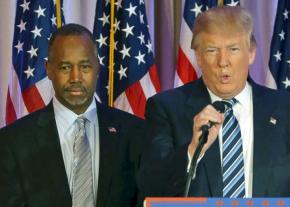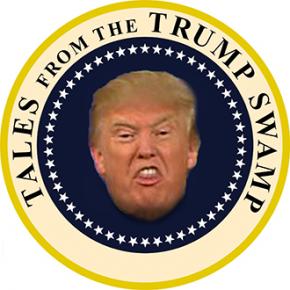Meet Dr. “Poverty Is a Choice” Carson
, author of When the Welfare People Come, explains what's in store as Ben Carson takes the helm at the Department of Housing and Urban Development.
WHEN DR. Ben Carson's name was initially bandied about as a potential cabinet nominee, there was a brief moment of unity between Carson and his critics.
The retired neurosurgeon and unsuccessful Republican presidential candidate reportedly told President-elect Donald Trump that he didn't think that he was qualified to run the Departments of Health and Human Services or Education, or any other entity he might be considered to head.
Activists working on health, education and poverty issues agreed wholeheartedly. Carson had distinguished himself during his campaign and earlier with a series of sometimes bizarre, often ill-informed and routinely offensive statements about poverty, class and religion.
There was real fear that in wielding government power in any capacity, he would indulge in his own reckless proclivities or at the very least fail to check those of Trump and his White House minions.
Carson's hesitance vanished when Trump offered him the position of Secretary of Housing and Urban Development (HUD) later in November. He decided that his qualifications for that job were adequate because, "I know that I grew up in the inner city. And have spent a lot of time there. And have dealt with a lot of patients from that area. And recognize that we cannot have a strong nation if we have weak inner cities. And we have to get beyond the promises and start really doing something."

CARSON'S PATH to political power has been as unusual as Trump's, and perhaps equally driven by the politics of modern celebrity.
Carson's distinguished if sometimes controversial career in neurosurgery became a legend, helped in part by his autobiography, Gifted Hands, which became a TV movie starring Cuba Gooding Jr. as Dr. Ben Carson. The climax of Gifted Hands is Carson's operation in 1987 to separate conjoined 7-month-old twins joined at the back of the skull, the first time such a procedure had been performed.
The book and movie celebrated the success of the daring procedure, although the reality seldom reported in media accounts was that brain damage resulting from the surgery left the twins institutionalized and with a variety of impairments they wouldn't have had if the separation hadn't been performed. One has since died, the other remains unable to talk, and their mother has expressed a lifetime of regret over agreeing to the surgery.
The aftermath of the surgery was positive for Carson, if not his patients. His bestseller made him a highly sought-after speaker, and his name recognition led to a celebrity endorsement deal for nutritional supplements.
In a light-hearted moment, he played himself in the Hollywood comedy Stuck on You, about the wacky antics of conjoined twins who are surgically separated, only to Velcro themselves back together.
Carson's celebrity wasn't based solely on being a rock star among neurosurgeons, however. Part of it was his inspirational story.
Carson was raised after the age of 5 by a single mother in Detroit and in Boston's Roxbury neighborhood. Surviving on food stamps and attending public school, Carson managed to graduate from Yale and go on to medical school. His story seemingly validates the notion that the U.S. readily offers opportunity to those willing to work for it.
As an adult, Carson characterized poverty as a "choice," saying in 2013:
Having grown up in dire poverty, the thing that I hated the most in life was poverty. I just hated poverty. But as I began to read those books, particularly about people's accomplishments, I began to realize that poverty was really more of a choice than anything else and that I could change that. And it really just depended on how hard I wanted to work.
CARSON'S STAR really began to rise among conservatives in 2013, when he delivered the keynote speech at the National Prayer Breakfast. Carson began with the biographical narrative that had been the mainstay of his paid speeches for years, then moved on to advocacy of a flat tax, based on a Biblical tithing formula--and condemnation of publicly supported health insurance.
After the speech, Carson went further, calling Obamacare "the worst thing to happen to America since slavery."
Carson's religiosity and criticism of government spending resonated with white conservatives, but his status as a Black hero willing to downplay racism through false equivalence made him very attractive to a Republican Party with very few African Americans in its ranks.
In his book One Nation, Carson described the "real tragedy" of Trayvon Martin's murder by racist vigilante George Zimmerman as being that "a young life was lost and another ruined because both individuals made assumptions about the other that were probably untrue."
On the strength of his popularity among conservatives, Carson rejoined the Republican Party in 2014 and began preparing to run for president in 2016. Like his erstwhile opponent and eventual boss Donald Trump, Carson made a series of bizarre statements during the campaign.
He suggested that the Holocaust could have been prevented if Weimar Germany didn't have gun control, proposed segregated restrooms for transgender individuals, speculated about what kind of traumatic events might make people gay, and said Muslims should be vetted for judicial and legislative offices, but barred from the presidency.
Ultimately, he dropped out after Super Tuesday and eventually endorsed Trump, who had previously questioned Carson's fitness for office based on possibly exaggerated accounts of his violent past contained in Gifted Hands. Trump reinforced his point by comparing Carson to a child molester.
ONCE THE unpleasantness of the campaign was forgotten, however, Trump offered Carson the position at HUD, and Carson, based on his resume as an inner-city child, felt ready to pick up the challenge. So what are the stakes if he is confirmed by the Senate and takes office?
HUD is a $48 billion agency administering housing subsidies and support for publicly constructed and operated housing. Both the Republican and Democratic Parties have retreated from even the appearance of robust support for affordable housing. The delay in Carson's confirmation is political, not really ideological--he won a unanimous voice vote of a Senate committee that included liberal stalwarts Elizabeth Warren and Sherrod Brown.
One of the few issues raised by Democrats in Carson's hearing was whether HUD spending could benefit Trump-controlled businesses or other entities. Carson refused to commit to refusing to do business with the Trump empire.
The more important issues are whether racial discrimination and segregation in housing will be combatted as a matter of federal housing policy, and whether federal support for public housing will be maintained at even their current inadequate levels.
On discrimination and segregation, the signs are not encouraging. In an op-ed in the Washington Times in July 2015, Carson described rules requiring municipalities to strike down discriminatory zoning ordinances as a condition for receiving HUD funds as an experiment in "failed socialism."
To further ensure that racial disparity isn't considered, Republicans have introduced a bill to prohibit the use of HUD funds to collect any "geospacial data" for the purposes of determining whether the Fair Housing Act is being violated.
More immediately, within an hour of Trump's swearing in, the Trump administration suspended a cut in Federal Housing Authority insurance rates, thereby increasing the cost to working-class borrowers attempting to secure a mortgage for buying a home.
Perhaps most frightening to the 1.2 million residents of public housing, the Trump administration brings indications of further cuts to operating support to public housing throughout the country. Support has been declining for decades, and there is widespread belief that public housing is a failed experiment that should be abandoned.
In many cities, public housing has been demolished on a massive scale, while in others with extremely tight housing markets, such as New York, the waiting lists are long, and every unit must be preserved in order to ensure enough working class housing for the city's economy to function.
Trump, when taking office, pledged no increase in federal spending, with the exception of defense, infrastructure and law enforcement, where he promised increases. He also pledged a tax freeze and no increase in the deficit.
Doing the math, this would require massive cuts in domestic spending, so there is reason to fear even more devastation to the budgets of public housing. In desperation, many municipalities will turn to "public-private partnerships" which don't produce truly affordable housing, and which strip green space, parking or play areas from public housing for the benefit of private developers.
Opposition to Carson's nomination from the Democratic Party is dependent on its broader power struggle with Trump. It will not be framed in terms of a right to quality, affordable housing. Continued organization and struggle will be required to fight both parties on gentrification and preservation of existing affordable housing.



